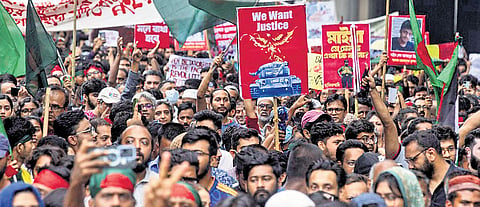Bangladesh’s war on Bengali identity picks up pace
The Bengali identity has two watermarks. Rabindranath Tagore and hilsa. The first is food for thought. The second inspires the Bengali’s thoughts for food. Bong gestalt soars above politics, religion and geography. Sadly, the topography is playing spoilsport. Is Bangladesh discarding its cultural identity, which the British dissected in 1905 and 1947? Pesciphile Calcuttans are traumatised over Dhaka banning the export of hilsa, just ahead of the Durga Puja season. Muhammad Yunus has decided if Sheikh Hasina can go to India, hilsa (ilish in Bengali) won’t.
A week before that, Muslim fanatics called for Bangladesh’s national anthem Amar Sonar Bangla, penned by Tagore, to be scrapped. A Jamaat-e-Islami zealot argued that it was “imposed by India”, forgetting that it was India which gave his country freedom, and an identity in 1971.
Until then Bengalis were chorusing the Pak national anthem: ‘Thou symbol of high resolve, O Land of Pakistan! Blessed be the citadel of faith’, and so on and so forth. It was written by the Jalandhar-born madarsa-educated school dropout, Hafeez Jalandhari. Tagore on the other hand won the Nobel Prize for Literature. The Bard of Bengal has his own melodious genre, ‘Rabindra Sangeet’. He founded free-thinking Shantiniketan.
In 2014, over two lakh Bangladeshis belted out Amar Sonar Bangla to celebrate Independence Day in Dhaka, breaking the Guinness World Record for ‘the most people simultaneously singing a national anthem’—imagine that. Though Bangladesh’s Adviser for Religious Affairs AFM Khalid Hossain has denied the new government would junk the anthem, lifting the ban on the pro-terror Jamaat-e-Islami party does not bode well for Tagore’s legacy in his country.
Jamaat bears the stain of collaborating with Pakistan during the 1971 Liberation War: about 4,00,000 Bengali women were raped by Pak soldiers in 1971 and over three million Bengalis were murdered. Bangladesh’s youth is now turning its back to its own history and the ghosts of its collective memory. It is clear it is experiencing a profound Freudian identity crisis; “parental estrangement” as psychologists call it.
Undoubtedly India’s unpopular foreign policy in the neighbourhood is a bully’s manual about how not to conduct external affairs. Nepal is no India fanboy. Little Bhutan is pissed off. New Delhi interfered in Sri Lankan matters, sent the IPKF to fight Tamil rebels, and now leverages aid to stay diplomatically solvent in the locality.
However, the Sri Lankan national anthem, written and composed by Ananda Samarakoon, Tagore’s student at Visva-Bharati University, is influenced by the master—some Banglaphiles even suggest Tagore himself wrote it. But he never sang about ilish, though he did write the short story Abdul Majhir Golpo in which the protagonist Abdul Majhi buys hilsa caught from the Padma River on whose bank his family’s country estates stood.
Never mind, the great 19th-century Bengali author Bankim Chandra Chattopadhyay did go into divine ecstasy while writing about ilish: “…my heart remains prostrated, overwhelmed by devotion, and refuses to leave that site of pilgrimage.”
No other culture in India, perhaps except the Tamils, has produced the most number of personalities who have shaped the subcontinent’s cultural, intellectual and religious life: Ramakrishna Paramahansa, Vivekananda, Aurobindo, Raja Ram Mohan Roy, Subhas Chandra Bose, Jagadish Chandra Bose, Nirad C Chaudhuri, to name a few.
The universal Bengali soul, now infected by Islamic bigotry, Pakistan’s inferiority complex about India, and nationalism in denial is facing further sundering. Hilsa and Tagore transcend national and sectarian boundaries to keep an eclectic, and even eccentric culture, globally united. A third partition of Bengal will traumatise its soul beyond healing.
Ravi Shankar
ravi@newindianexpress.com

